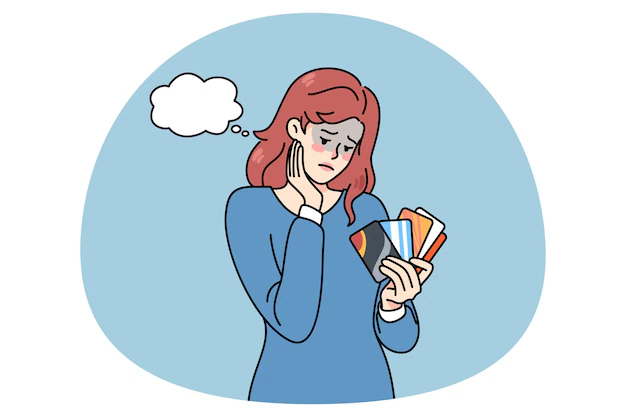Are you one of those people who finds it difficult to resist the urge to spend money? Do you often find yourself impulsively shopping or using your credit card to make purchases you don’t necessarily need? If so, you’re not alone. Many people struggle with the temptation to spend money, even when they know they shouldn’t.
There are a number of reasons why it can be hard to avoid spending money. For some people, it may be a matter of psychological fallacies or a failure to delay gratification. Others may engage in retail therapy as a way to cope with stress or anxiety.
Furthermore, social peer pressure and overspending can also contribute to a person’s difficulty in curbing their spending habits. Whatever the reason, it’s important to understand why you may be struggling to avoid spending money so that you can take steps to address the issue.
If you’re someone who struggles with overspending or impulse shopping, it’s important to recognize that these habits can have serious consequences.
They can lead to financial problems, such as debt and a lack of savings, and can also take a toll on your mental health and well-being.
It crucial that you take steps to understand why you struggle with spending money and implementing strategies to address the issue, you can regain control over your finances and improve your overall quality of life.
In this beneficial article we will address the question: why is it so hard to not spend money? And then we will discuss some tips that can help you stop spending money excessively.
Why Do We Spend Money?
Have you ever wondered why you can’t seem to stop spending money, even when you know you should be saving it? It’s a common problem that many people face. The truth is, there are many reasons why we spend money, and understanding these reasons can help you gain control over your spending habits.
The Psychology of Spending
One of the main reasons why we spend money is due to the psychology behind it. Our emotions and thought patterns can play a significant role in how we spend our money. Here are some of the psychological factors that influence our spending habits:
- Anxiety: When you’re feeling anxious or stressed, you may be more likely to spend money as a way to cope with those feelings. Retail therapy is a real thing, and many people turn to shopping as a way to feel better when they’re feeling down.
- Fun Money: We all need to have a little fun in our lives, and spending money on things we enjoy can be a way to do that. However, when we start to use our fun money as a way to fill a void or distract ourselves from other issues, it can become a problem.
- Instant Gratification: We live in a society that values instant gratification. We want what we want, and we want it now. This mentality can lead to impulsive spending and poor financial decisions.
- Social Pressure: We’re often influenced by the people around us. If our friends or family members are spending money on certain things, we may feel pressure to do the same. This is especially true when it comes to social events or activities.
Understanding the psychology behind our spending habits is the first step in gaining control over them. By recognizing the factors that influence our spending, we can start to make more intentional and informed decisions about our money.
The Temptations of Shopping
It’s hard to resist the urge to spend money, especially when shopping has become so convenient and accessible. You are bombarded with ads and deals everywhere you go, making it even harder to resist the temptation to buy things you don’t really need. Here are some of the most common temptations of shopping that make it so hard to not spend money.
The Power of Advertising
Advertisers know how to get your attention and make you want to buy things. They use persuasive language, appealing visuals, and catchy jingles to create a desire for their products. They make you believe that you need their products to be happy, successful, or fulfilled.
They also create a sense of urgency by using phrases like “limited time offer” or “while supplies last.” This makes you feel like you need to act fast before it’s too late.
The Convenience of Online Shopping
Online shopping has made it easier than ever to buy things with just a few clicks. You can shop from the comfort of your own home, at any time of the day or night.
You can easily compare prices and products, read reviews, and find deals and discounts. You can also use credit cards or other payment methods that make it easy to spend money without even realizing it.
However, online shopping also has its downsides. It can be hard to resist the temptation to keep browsing and buying more things. It’s also easy to overspend or buy things you don’t really need.
Plus, with the rise of online scams and identity theft, it’s important to be careful when sharing your personal and financial information online.
In conclusion, the temptations of shopping can make it hard to resist the urge to spend money. The power of advertising and the convenience of online shopping can make it even harder to control your spending habits.
Nonetheless, by being aware of these temptations and taking steps to avoid them, you can learn to manage your money more effectively and avoid unnecessary debt.
The Consequences of Overspending
Overspending can have a number of negative consequences, some of which can be long-lasting. In this section, we will explore two of the most common consequences of overspending: debt and the guilt that often comes with it.
Debt and Its Consequences
One of the most obvious consequences of overspending is debt. When you spend more money than you have, you may need to rely on credit cards or loans to make ends meet. Over time, this can lead to a significant amount of debt, which can be difficult to pay off.
Debt can have a number of negative consequences. For one, it can be stressful and overwhelming. If you have a lot of debt, you may feel like you are constantly struggling to keep up with payments. This can lead to anxiety and even depression.
In addition, debt can limit your options. If you have a lot of debt, you may not be able to buy a house or a car, or even take a vacation. This can be frustrating and can make it feel like you are stuck in a cycle of debt.
The Guilt of Overspending
Another consequence of overspending is the guilt that often comes with it. When you overspend, you may feel guilty about your purchases, especially if they were unnecessary or frivolous. This guilt can be difficult to shake and can lead to feelings of shame and embarrassment.
In addition to the emotional toll, overspending can also have a financial impact. If you feel guilty about your purchases, you may be more likely to avoid looking at your bank account or credit card statements. This can make it difficult to keep track of your spending and can lead to even more overspending.
Overall, overspending can have a number of negative consequences, from debt and financial stress to guilt and shame.
If you find yourself overspending, it’s important to take steps to address the issue and get back on track.
This might include setting a budget, tracking your spending, and finding ways to save money. By taking control of your finances, you can avoid the negative consequences of overspending and enjoy a more stable financial future.
How to Stop Spending Money
If you’re struggling with overspending, don’t worry, you’re not alone. It can be challenging to resist the urge to buy things you don’t need. However, with a few simple changes to your lifestyle and some expert advice, you can learn how to stop spending money and take control of your finances.
Adopt A Frugal Lifestyle
One of the most effective ways to stop spending money is to adopt a frugal lifestyle. This means being mindful of your spending habits and finding ways to cut back on unnecessary expenses. Here are some tips to help you get started:
- Create a budget: Make a list of your monthly expenses and income. This will help you identify areas where you can cut back and prioritize your spending.
- Meal plan: Planning your meals in advance can help you save money on groceries and reduce the temptation to eat out.
- Shop second-hand: Thrift stores and online marketplaces can be great places to find gently used items at a fraction of the cost.
- Use cash: Paying with cash instead of credit cards can help you stay within your budget and avoid overspending.
There are many other old-fashioned frugal living tips that can help you with overspending.
Expert Advice
In addition to adopting a frugal lifestyle, there are also some expert tips that can help you stop spending money. Here are some suggestions:
- Wait before making a purchase: Instead of buying something on impulse, wait a day or two to see if you really need it.
- Avoid sales: Sales can be tempting, but they can also encourage you to buy things you don’t need. Stick to your budget and avoid the temptation to overspend.
- Use a shopping list: When you go shopping, make a list of the things you need and stick to it.
- Find a support system: Surround yourself with people who share your financial goals and can offer support and encouragement.
By adopting a frugal lifestyle and following some expert advice, you can learn how to stop spending money and take control of your finances. Remember, it’s never too late to start making positive changes and working towards a more secure financial future.
YOU SHOULD ALSO READ:











